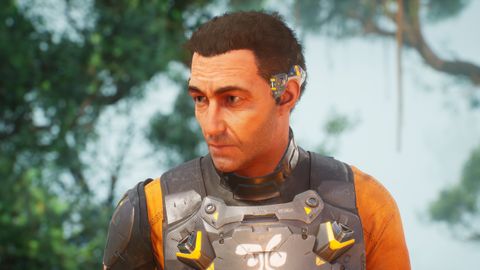Our Verdict
A pleasing world and satisfying jetpack exploration aside, Cutter Slade's return is rarely out of this world.
PC Gamer's got your back
What is it? A sequel to the 1999 classic action-adventure game, Outcast.
Release date March 15, 2024
Expect to pay $59.99 / £49.99
Developer Appeal Studios
Publisher THQ Nordic
Reviewed on Nvidia RTX 3090 Ti, 32GB RAM (DDR4), AMD Ryzen 7 5700X, ASRock B450M Pro4
Multiplayer? No
Steam Deck Yes
Link Steam
There's a fundamental contradiction between how Outcast – A New Beginning looks and sounds to how it actually plays. Visually, it's often epic. The alien world of Adelpha has never looked better, with Pandora-lite environments seamlessly alternating between lush, verdant forests, shimmering coastal beachfronts, rocky mountainous expanses, snow-capped peaks and waterfall-laden ancient metropolises partially reclaimed by nature. The audio, utitlising the same sweeping orchestral soundtrack of the original game, is also beautiful and atmospheric—it always speaks of wondrous cosmic adventures that await. What a shame, then, that hero of the hour Cutter Slade spends so much of his time in Outcast – A New Beginning undertaking very mundane, far from epic, open world busywork.
Here's a typical sort of exchange. Cutter Slade, ex-Navy SEAL and now, after far too long trapped on the alien world of Adelpha, haggard-looking dad bod chosen one, goes to alien Talan A because Talan B has told him he needs to for plot purposes. Talan A, after lengthy dialogue, much of which welcomes the skip button, reveals he can help Cutter but only after the cosmic space adventurer has gone to D to gather X amounts of Z. But D can't be accessed until Talan C has been helped with Y. And so on and so on.
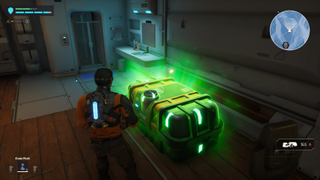
These tasks vary in mundanity, ranging from escort missions (such as slowly guiding a Twon-Ha space ostriches, who constantly need you to double back if you get even a little bit too far from them), to item collecting missions (grab 10 space fruits), to straight-out domestic chores (herding 12 space cows into a pen). At mutliple times there are mechanics where for a location's main plot to be advanced, you literally have to go gather a certain amount of resources and walk up to a table/pot/bench with a "0/10" amount indicator floating above it, and feed the resources into it. In these moments, progression is straightforward courier work while watching virtual numbers go up. Go get 10 bug larvae, return to pot, put larvae in pot. Wow! Now I feel like a kick-ass ex-Navy SEAL space adventurer for sure.
It's an odd and slightly deflating experience, and especially so after the Outcast's initial wind-up jolts you into the game's out of this world setting, story and gameplay mechanics in a pretty choppy opening 30 minutes, replete with disorientating cinematics and a functional but trite tutorial. I just about hung on as I'd got the background of what came before in the original Outcast lodged in my memory, but it did make me wonder what a completely fresh gamer would think.
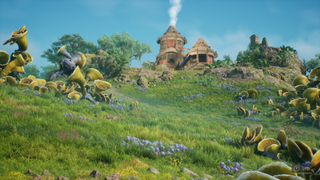
Luckily, by the time the opening part of Outcast – A New Beginning is over, the key plot points are clearer: Adelpha is being plundered by baddies for its natural resources and the native Talan aliens are essentially enslaved and powerless to stop this. Luckily, Cutter, who is desperately trying to get back home, can help achieve this by aiding the Talans in two main ways: one is to help bring life to Adelpha (via doing much busywork so a Talan mating festival can take place) and the other is to bring death to the invaders and kick them out. Progressing both of these macro plots splits the game down the middle content-wise, really, with one side naturally leaning a lot towards combat missions and the other more towards exploration, communicating with locals and, yes, fetch quest busywork. Do bits of both of these things in each Adelpha village and Cutter will get the support he needs from the village chief. Once all chiefs have signed up then… yeah, you see how this works.
Being candid, while this game's combat is solid (we'll get to that later), this core game structure, which almost revels in open world chores and stuffed dialogue wheels, would not survive one moment if it were not for this game's excellent and empowering movement, which comes courtesy of Cutter's jetpack. This jetpack, which you get right from the start of the game and can be upgraded in a number of cool ways, seriously lightens the load when undertaking yet another uninspired quest, as it makes exploration and travel really fun.
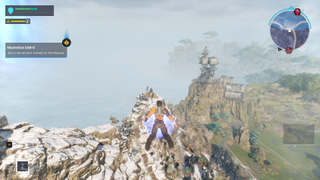
Jetpack joyride
Cutter can boost jump with his jetpack (multiple times with a few upgrades), hover at speed over the surface of Adelpha (including water, which is really cool), and even take full flight in bursts. It's like Alloy's glidey parachute mechanic in the Horizon sequel but far cooler and more useful. Gain height with the jetpack and you can dive towards the earth and then swoop like a bird, only to regain height, and do the whole thing again. Upgrade the jetpack to the backend of its ability tree and you can scream around Adelpha like The Rocketeer, which is bang on point for Outcast's classic sci-fi adventure comic feel.
Indeed, I would argue that the jetpack is the thing that really helps replicate some of the original Outcast's expansive wonder. In the original game it was mind-blowing to think that if you could see somewhere in one of its interconnected worlds then you could reach it, while each shimmering portal offered a magic door to another wondrous realm. In A New Beginning, the jetpack is your key to reaching those epic-looking lands that you can see in the distance, or way up high in the sky, and unlike the original, there are no loading screens between areas. This is one big open world and the jetpack lets Cutter fly about all of it. Portals, of which there are many, are really just pretty shortcuts.
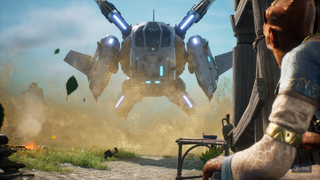
At least Appeal, the developer here, seems to realise this, and has built in a large number of jetpack time trials to enjoy. These involve discovering a trial's starting point (a magic space bulb) and then following a glowing trail successfully without crashing or getting shot out of the sky. Reach the bulb and you can slash it open for points that can go towards upgrading or unlocking new abilities. I found myself drawn to these trials and they tapped into the best part of the game. Crucially, there is never a dialogue wheel or item collection bucket in sight. It's pure boosting, gliding and flying around a pretty alien world, and that's all right by me.
On the ground the jetpack proves useful, too, allowing Cutter to essentially long jump by pressing the dash button and then the jump button in sequence. This sees Cutter hurled in any direction at great speed and is great for jumping over expanses or, more critically, closing ground on enemies or dodging their attacks in combat scenarios.
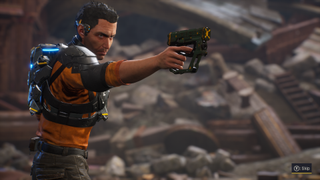
Extreme prejudice
Combat in Outcast – A New Beginning is a third-person over-the-shoulder affair that feels like Mass Effect: Andromeda but without a cover system. Cutter has an energy shield (which can also be used as a melee weapon) to block incoming fire and then a small arsenal of pistols and rifles to dispatch evil robotic types or hostile native beasts.
Weapon customization is a highlight of Outcast. Every slot has mod slots, and if you get a specific ability you can even upgrade those slots. When you factor in the wide array of mods, there's a lot a player can do to tailor their loadout to their tastes/playstyle.
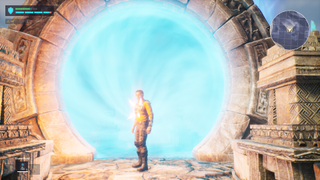
For example, certain mods will make it so a weapon will slightly heal Cutteron a kill, while others allow ammunition to automatically home to targets, largely taking aiming out of the question (the game's auto lock-on is supremely generous by default). Other mods let weapons fire explosive mines, reduce cooldowns, make the weapon fire multiple rounds at once, improve damage against a specific type of enemy, enhance the fire rate, boost damage dealt close to overheating and so on. There's loads of options and you can chop and change your loadout without penalty.
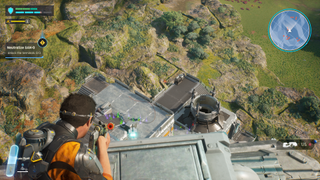
With these weapons Cutter is tasked with eradicating enemy facilities, either to shut them down and rob them of their energy cores, or to free prisoners who are being held hostage. It's standard go here, clear this, loot that stuff, but it is still pretty satisfying to undertake. Weapons have punch, and when you factor in the dodging and manoeuvring options Cutter's jetpack delivers, fights can be quite dynamic. Occasionally there is a boss fight, but you're doing the same sort of stuff. Dodging attacks and shooting vulnerable points. Enemy bases are of course filled with space chests, which once looted, provide valuable upgrade points. You know the score.
When Cutter's not shooting enemy robots he's clearing hostile native beast nests that have spread over Adelpha. These play very much like the monster nests in The Witcher 3: Wild Hunt. You go to an area, have to kill a set amount of creatures, destroy some creature nests, then blow up the central infestation. These are repetitive as the creatures have very basic attack patterns and only prove any sort of challenge because there are so many of them. It's more a case of shooting random moving things until there's nothing left moving. It's not very epic at all.
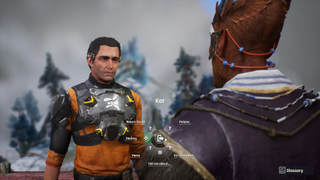
Old dog, old tricks
Outcast – A New Beginning is a perfectly serviceable open world game—one that plays to the heritage of the series in terms of its pretty world and musical score, as well as '70s space adventure comic vibes and tone. But while its presentation is new, the experience beneath it, in general, is not. Not bad by any means, but this is unadventurous open world gaming that, jetpack aside, you've experienced before.
A pleasing world and satisfying jetpack exploration aside, Cutter Slade's return is rarely out of this world.
Rob is editor of PC Gamer magazine and has been PC gaming since the early 1990s, an experience that has left him with a life-long passion for first person shooters, isometric RPGs and point and click adventures. Professionally Rob has written about games, gaming hardware and consumer technology for almost twenty years, and before joining the PC Gamer team was deputy editor of T3.com, where he oversaw the website's gaming and tech content as well its news and ecommerce teams. You can also find Rob's words in a series of other gaming magazines and books such as Future Publishing's own Retro Gamer magazine and numerous titles from Bitmap Books. In addition, he is the author of Super Red Green Blue, a semi-autobiographical novel about games and gaming culture. Recreationally, Rob loves motorbikes, skiing and snowboarding, as well as team sports such as football and cricket.
